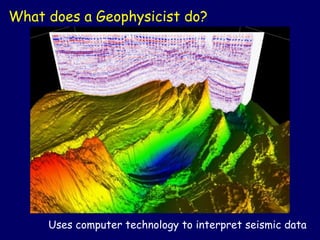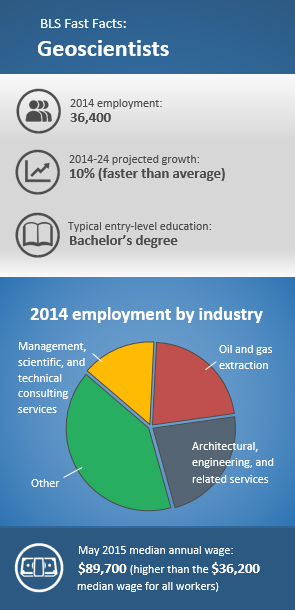All Categories
Featured
Table of Contents
Geophysicist Salary And Job Description 2023 in Nollamara Aus 2021
This work is increasingly contracted out, so consultancies provide another source of work. Consultancy companies vary in size, from really little companies to large multinationals. Some consultancies are rather specialised in using specific geophysical strategies or working in particular locations, while others use a more diverse series of services to their clients.
The extraction of gas from garbage dump websites is another location of work and this might grow in the future. Expedition companies might carry out work for building firms, water business, mining business and ecological agencies, so geophysicists might be utilized in any of these settings. Other employers include: geological surveysgovernment bodies and agenciesuniversities and research study institutes.


Vacancies might be noted in the oil and gas sector press. Recruitment is affected by oil rate fluctuations and the level of competition for positions differs depending upon this. Professions Days, which cover the full series of geoscience professions and are generally gone to by a variety of key market companies, are run by The Geological Society.
Geophysical Surveys As Landscape Archaeology in Sorrento Australia 2022
Some of the large oil and gas companies use a complete two-year structured training programme across the breadth of geophysics, including the opportunity to experience work in different teams prior to specialising in one location. Your training may consist of deal with: existing wellsmagnetic and gravitational prospective field data analysisresearchrock analysis. It's more usual for your preliminary training to be provided on the job.

There may be a probationary period during which you work alongside a skilled coworker. Competency-based appraisals occur routinely in most firms. In smaller sized companies, and for scholastic posts, there is not likely to be any formal training - you'll be expected to start work straightaway and get abilities as you go along.
If you work for a smaller sized business, you might find that you require to take responsibility for arranging and moneying your own development and training. If you have a geology degree, membership of The Geological Society can be helpful for networking and for maintaining to date with the market.
What Does A Geophysicist Do? in Two Rocks Aus 2020
You may also discover it useful to join the PESGB (The Petroleum Exploration Society of Great Britain, which has a geophysics special interest group. After a probationary duration, and as soon as you have actually gained some experience, you might progress to senior geophysicist, then team leader and then into a senior function in management.
The ease of motion in between functions depends on the company structure. Research study at Masters or Ph, D level in a subject related to geophysics or geosciences might help with your profession development and progression. The employment market within the oil and gas industry is extremely dependent on cost and this might affect your opportunities for profession development.
Not all tasks are dependent on the oil and gas industries. For knowledgeable geophysicists, freelance consultancy uses a good route for profession development. You can also specialise in a specific area of geophysics. As a geophysicist, you're most likely to have a number of tasks throughout your working life. Worldwide mobility is vital for handling peaks and troughs in various nations at different times.
Geophysicist: What Is It? And How To Become One? in Casaurina Aus 2021
From geophysics, it's possible to focus on seismology (completing additional training to end up being a seismic interpreter) or to move into related areas such as engineering geology or risk prediction.
Deciding what to study in college is a tough choice. Even if you understand that your field of interest lies in science, what program of research study is best for you? If you make the decision to significant in physical and life sciences and pursue a career as a geophysicist, you're preparing for an exciting and profitable occupation.
The first action to achieving your objective of ending up being a geophysicist is earning a degree. Even for entry-level positions in the field of geoscience, you'll require a bachelor's degree (a geophysicist college degree) from a certified college or university. Some research study positions require candidates to hold master's degrees and even Ph.
What Can I Do With A Major In Geophysics? in Mundaring Western Australia 2023
Postgraduate degree are especially crucial if you prepare to teach at a four-year organization. Geophysicists apply physics ideas and strategies to study the gravitational, magnetic, and electrical fields of the earth. This furthers researchers' understanding of both the world's interior core and its surface area. Geophysicists should be able to: examine rocks, photographs, and other pieces of data perform research both in the field and in laboratories produce maps and charts of their findings compose reports To accomplish all this, students need a specialized education for geophysicist professions.
As stated above, you'll need a bachelor's degree in geoscience or a related discipline, such as a physical science or a natural science, to land an entry-level job. But trainees can also prepare by majoring in topics like: Biology Chemistry Computer system science Engineering Mathematics Physics The above geophysicist majors offer a more generalized approach to a single clinical discipline, but most programs need trainees to take one or more geology course.
Latest Posts
Geophysicist Job Description in Guildford Aus 2023
Marine Geophysical Surveying - in Maddington Aus 2023
Geophysical Survey - Suffolk Heritage Explorer in Millendon WA 2023